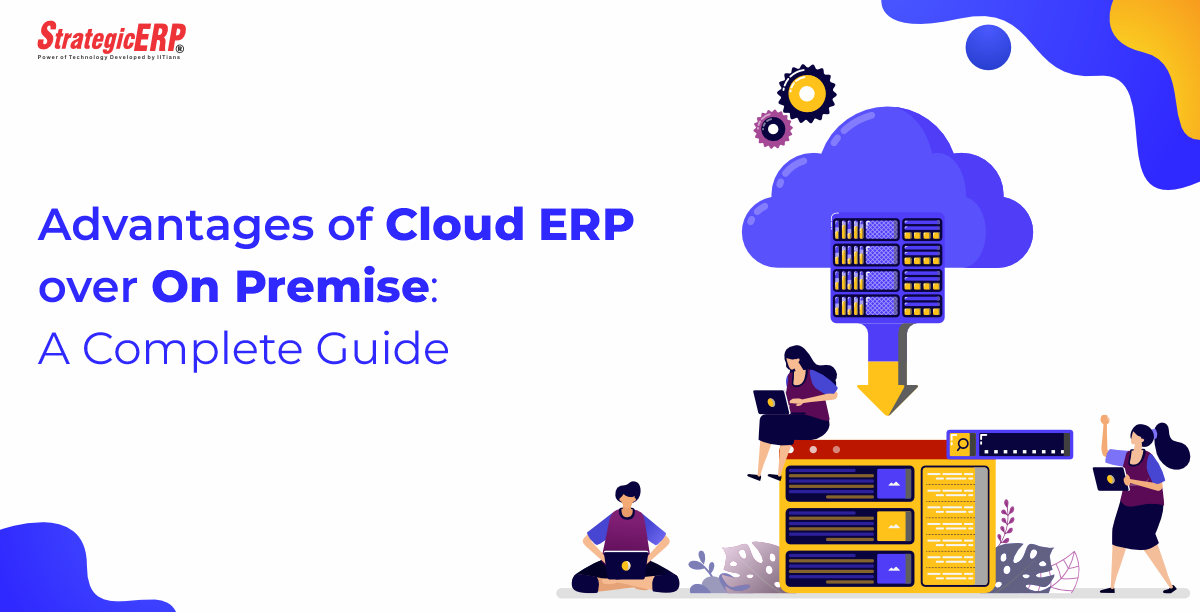Advantages of Cloud ERP over On Premise: A Complete Guide
Category : ERP
Blog posted by : Admin / 31 Oct, 2022
Cloud ERP systems are more popular than on-premises software. An ERP Report by Panorama Consulting Group in 2021 found more than half of the companies that employ an ERP system, use cloud computing.
Cloud storage has become the norm and companies are migrating for a more scalable, dynamic, and futuristic system. The market will be worth $130 billion by the year 2027, as predicted by MarketsandMarkets Research Pvt. Ltd. in their Cloud ERP Market report 2022.
How does a Web-Based Enterprise Resource Planning system differ from On Premises Software?
For an ERP system deployed on the company’s premises, the owner assumes ownership of all tasks such as maintenance, storage, updates, and safety. In a cloud ERP system, users access data over the internet. Data is not stored on location, but on a remote server.
Advantages of Cloud ERP over On Premise
Cloud computing offers multiple benefits to enterprises of all sizes; small, medium, and large, in comparison to ERP on premise.
Upfront capital cost is reduced significantly as the customer does not need to purchase any hardware. The security and maintenance of the information stored on the cloud, is taken care of by the provider.
Example: In the real world, purchasing a cloud ERP system is quite easy. After negotiations over the purchase order have ended, the client receives their login credentials, using which they can access their automation software through a web browser, on the systems they already are working on. The client does not need to purchase any computers, server or hardware for the web-based automation software.
One of the advantages of Cloud ERP over on premise is its shorter deployment time as no physical infrastructure needs to be set up. The software is accessible over the internet. A SaaS based solution for small businesses can be deployed immediately while a heavily customized system for a large enterprise will take more time.
Example: Business process automation systems can process large amounts of data in a short amount of time to generate valuable insights for the client’s business. CRM software requires the sales and marketing team to input data about leads and customers. The filtering, segregation, data analysis and generation of various reports is done by the Artificial Intelligence integrated software.
With cloud based ERP software being accessible over the internet, it can be used anytime from any location. All a user needs is either a laptop, computer, tablet or mobile ERP app and an internet connection. Any increase in demand can be easily incorporated by adding more users or expanding storage as the software is scalable on demand.
Example: An organization is expanding its operations at another site and needs to onboard 10 new members for an ongoing project. All the company needs to do is send in a request to the provider, who in turn sends a quotation for the scaling operation. Post-finalization, the necessary additions are done within the automation system and new members can be trained immediately.
As a fully functional online system, one of the advantages of cloud ERP over on premise ERP is the effectiveness of its collaborative prowess irrespective of geographical locations. The secure cloud computing platform is built with vendor, contractor, liaison, and employee self-service modules, wherever needed.
Example: Through the construction ERP software, a builder can store vendor information on a centralized platform, compare and shortlist them, negotiate and finalize contracts. This results in better contract selection and provides more value by helping improve vendor relationships. Site managers, CFO, accounts team and vendors will be able to access the same information in real-time, track its progress and act on it without any delays.
Cloud adoption digitally transforms all processes of an organization to create collaborative, optimized and seamless workflows. It drastically changes the way the organization operates and provides a huge boost in productivity and efficiency. It puts the customer technologically ahead of its competitors as it integrates the latest technologies.
Example: Consider ERP software for real estate businesses. Productivity and efficiency are boosted through the automation of workflows for pre-sales, sales, finance, projects, sites, contracting, purchase, inventory, audit, finance, legal, and employee management. As these processes are automated, employees spend minimal time on manual tasks and spend more time strategizing based on the insights provided by the automation software.
Additional Benefits of Cloud over On Prem:
1. Integration with the latest technologies such as Artificial Intelligence (AI) and Internet of Things (IoT)
2. Allows users to pay for only the storage and computing capacity being used
3. Data protection, backup, recovery, and server security plans in place
4. Workflows can be tailored by the developer, upon request
5. Low code and no-code programming is also available for easy customizations by users
Frequently Asked Questions about Cloud ERP and On Premises Software
FAQs
1. Can the cloud based ERP software be updated?
Users will be able to see the new updates, fixes, and features on the ERP store. They can download or purchase them and install them instantly.
2. Do on premise ERP systems come with mobile ERP apps?
It can be a bit of a hassle as a third-party will be needed to communicate between the on premise system and the mobile phone.
3. What are some of the drivers of Cloud ERP?
Increased internet penetration, 5G network, Artificial Intelligence insights and government initiatives to support digitalization.
4. What business functions can cloud ERP be used to streamline?
Project management, sales and marketing, finance, accounting, inventory, quality, HR and payroll, contracting, compliance, and more.
Enterprise Resource Planning systems being offered on cloud have made them more accessible, manageable and affordable for businesses of all sizes. They will remain the system of choice because of their zero upfront costs, no maintenance and security responsibilities, quick deployment and instant upgrades.







